Celebrating Latino Conservation Week
We’re highlighting Latine conservationists across Wisconsin in celebration of Latino Conservation Week! LCW is September 14-22 and was created by Hispanic Access Foundation to support the Latine community getting outdoors and participating in activities to protect our natural resources. The term “Latine” is similar to “Latino” but more inclusive of all genders and easier to pronounce in Spanish than “Latinx.”
At NRF, we are committed to advancing diversity, equity, and inclusion across Wisconsin’s conservation field. We believe that everyone deserves to enjoy the natural world, and be welcomed into conservation efforts, too. Additionally, we know that bringing diverse partners together is the only way to protect our natural wonders for future generations. Follow along as we highlight the incredible work of several Latine conservationists in Wisconsin!
Angélica Sanchez, Owner of Cultural Cloth
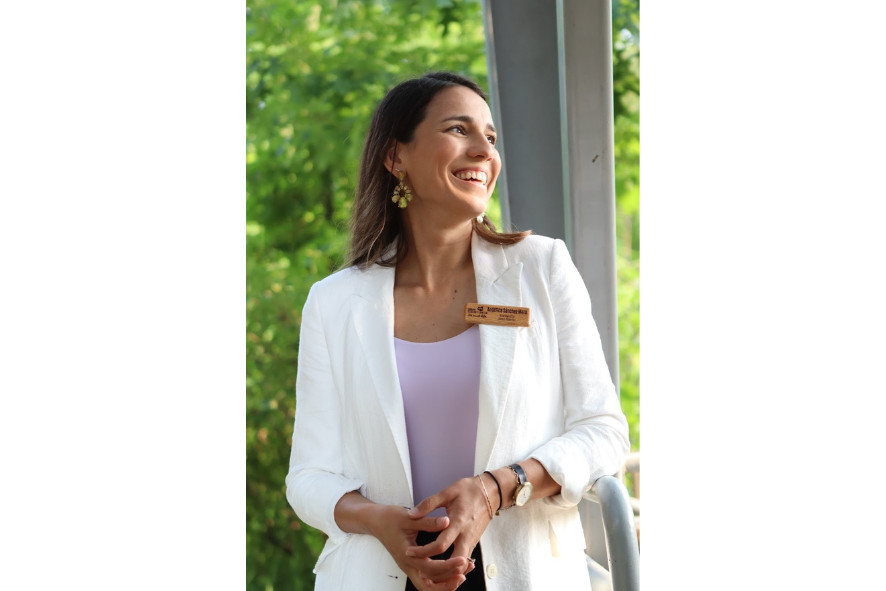
Angélica Sanchez looking off camera and smiling. Photo courtesy of Angélica Sanchez
Angélica Sanchez grew up in Guadalajara, the second largest city in Mexico. She spent much of her childhood on her parents’ farm on the outskirts of the city. Angélica and her siblings would explore and catch frogs all day until it was time to head back inside for a meal. She credits how comfortable she feels outside to her parents who often took her and her siblings to green spaces for picnics and exploration.
Unfortunately, woven within her positive memories of nature are not so fun memories, too. Angélica recalls travelling to her grandparents’ farm and covering her nose when she drove over a polluted river. She remembers seeing rainbow fields of trash on cliffsides, instead of wildflowers. For young Angélica, this was normal, and she never doubted that the land shouldn’t be polluted. It wasn’t until later in life that she realized the environment needed saving, and that she could be part of that through a career in conservation.
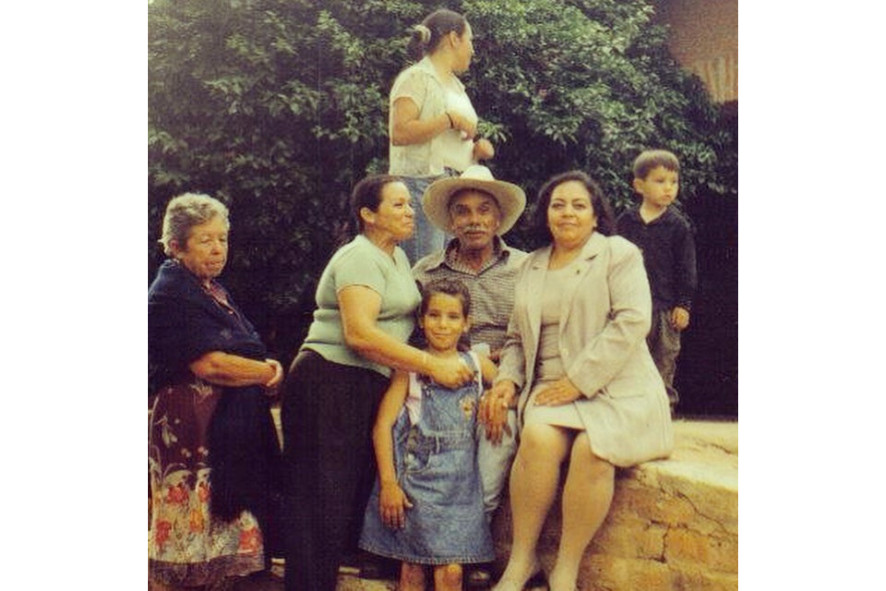
Angélica, when she was young, and her family at her grandparents’ farm. Photo courtesy of Angélica Sanchez
Angélica received her bachelor’s degree from the University of Wisconsin-Milwaukee in conservation and environmental science. Throughout her time in school, Angélica had a very holistic approach to her studies. She received minors in business and global studies. While working on a permaculture project in Kenya, Angélica connected with the local community as part of her research. This experience helped solidify her love for the “people side” of conservation.
Angélica completed her master’s degree in environmental conservation at the University of Wisconsin-Madison. Then, she spent six years working at the Urban Ecology Center (UEC) in Milwaukee. Starting out as a Spanish bilingual environmental educator, Angélica workshopped nature-based play and hands-on science programming for children. Later, she became the Branch Director of Menomonee Valley, which is in a predominantly Latine neighborhood. There, UEC’s programming focused on the cultural component of the neighborhood to connect people to nature and each other.
Currently, Angélica is the owner of Cultural Cloth, a handmade homegoods and decor store. The team at Cultural Cloth works with women artisans across the world to promote unique, homemade home goods and textiles. Angélica is excited to incorporate sustainability and environmental justice in her new role.
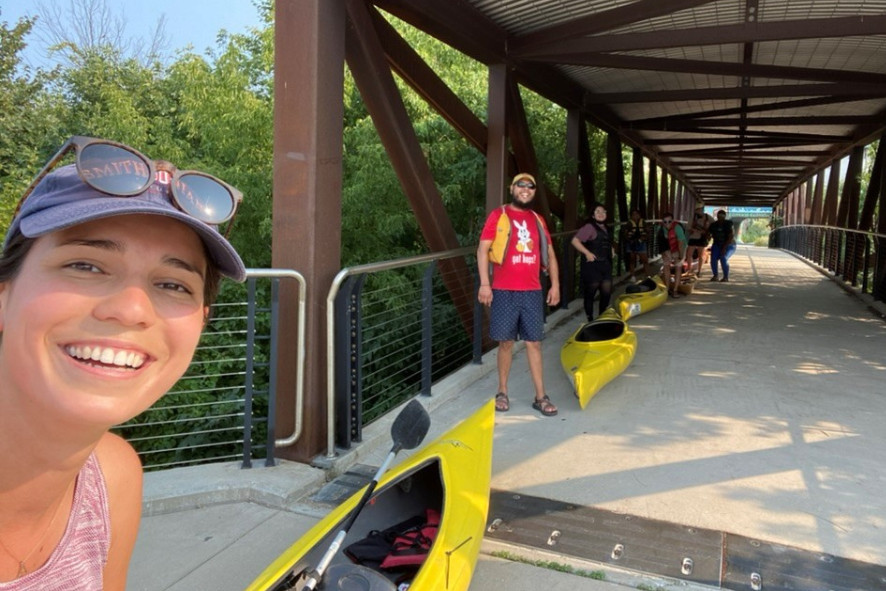
Angélica and a group of people lined up with kayaks. Photo courtesy of Angélica Sanchez
Throughout her career, Angélica has loved helping people develop positive relationships with the outdoors. Whether through a program, a kayaking trip, or a piece of art, Angélica knows that there is not just one way of enjoying nature.
Everything that I’ve done has been around that, getting people to have a positive relationship with nature and enjoy it as much as they can.
For Angélica, Latine representation in the conservation field means supporting environmental justice efforts. Large cities experience water and noise pollution, and many other environmental issues that affect communities of color the most. Angélica says, “if people aren’t involved in solutions for the issues that affect them directly, those solutions won’t be as effective.” A huge part of engaging more Latine people in conservation is outreach, according to Angélica, especially through family and friends. Undoubtedly, building trust with schools or families can have a domino effect for getting more community members involved. Angélica believes that people want to mobilize; they want to fix things. Sometimes, they just don’t have the time, resources, or support to do so. That’s why organizational outreach is so crucial. The first step? Building trust.
Culturally, we are more inclined to trust or be part of something if we’re being told by a friend or someone we know.
Ricardo Costa, Associate Director of Agriculture Strategies WI at The Nature Conservancy Wisconsin
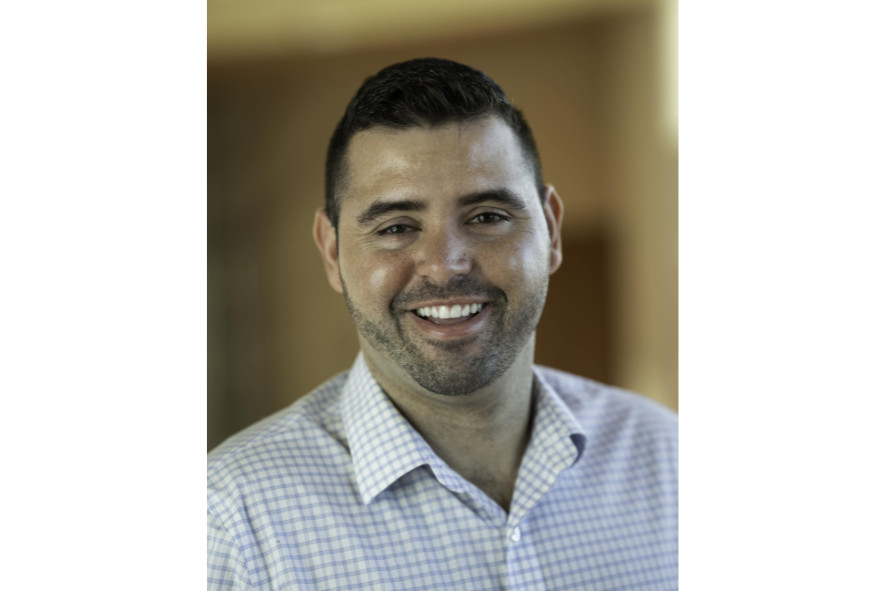
Headshot of Ricardo. Photo courtesy of Ricardo Costa
Ricardo Costa truly believes he was “in the right place at the right time” when he was accepted into a study abroad program that changed the trajectory of his life. Originally from Brazil, his family was low-income, and his mother worked hard to put food on the table. Growing up in a rural, small town, college wasn’t something people really talked about. But, Ricardo knew he wanted a better life for himself and his mother.
In school, Ricardo always loved biology. He began studying agronomy at UFMT – Universidade Federal de Mato Grosso and joined a 2-year, fully-funded, study abroad program called “Science without Borders.” Through the program, he chose to attend Kansas State University, specifically for their agricultural school. Ricardo called it “love at first sight.” After finishing his bachelor’s degree in Brazil, Ricardo attended University of Missouri, Columbia to complete a master’s degree in plant sciences. His research focused on wheat control in organic systems and introduced him to the world of cover crops and conservation.
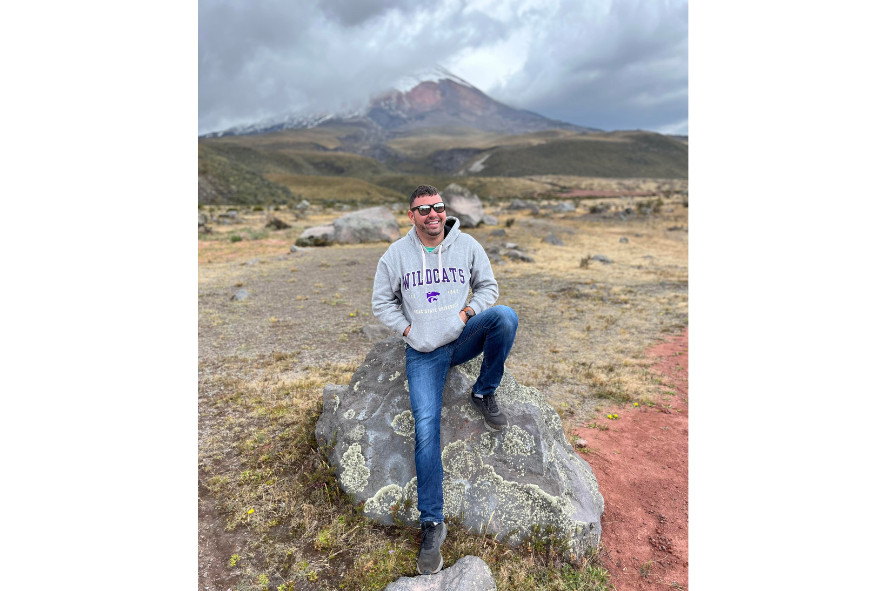
Ricardo sitting on a rock in front of Cotopaxi volcano in Ecuador. Photo courtesy of Ricardo Costa
For several years, Ricardo worked for Michigan State University – Extension and taught evening plant pathology classes. Then, he decided to transition into a larger role as the Associate Director of Agriculture Strategies with The Nature Conservancy (TNC) of Wisconsin. In his role, Ricardo supports farmers with more environmentally friendly farming practices to combat climate change. Ricardo strongly believes that the work he is a part of at TNC will be his conservation legacy. Currently, Ricardo and his partner are influencing over 375,000 acres of conservation almost every year through partnerships.
You celebrate today, but then you ask yourself ‘how can I get even more conserved next year?’
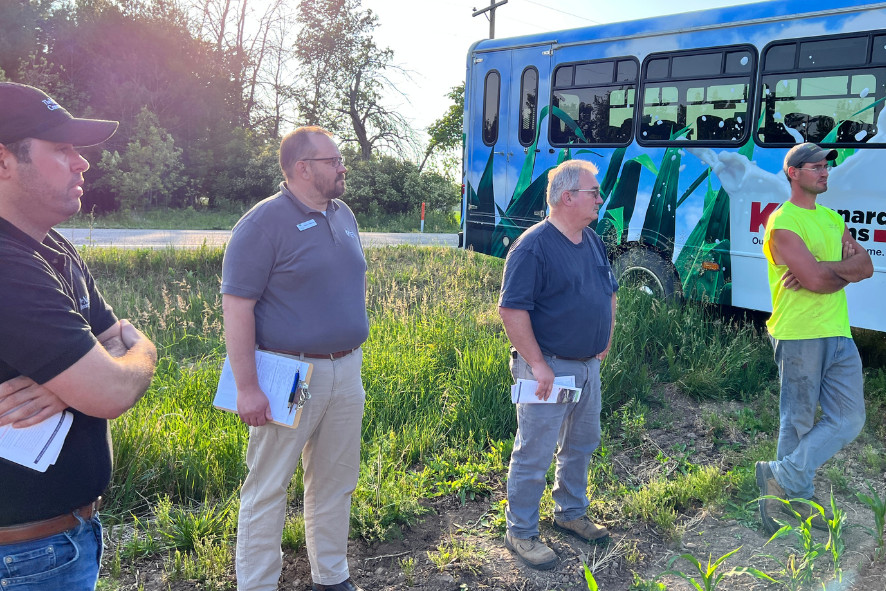
Ricardo (far left) talking with farmers. Photo courtesy of Ricardo Costa
The most rewarding part of his work is building partnerships with people and getting conservation on the ground, one acre at a time. When asked why he thinks it is important to have more diverse representation in the conservation field, Ricardo said the following:
Life is so much better when you see people that are different from you. Diversity will always bring different perspectives. Not only at the ground level but at every level in the conservation field. If a Latine kid sees someone like me working in conservation, it shows them that they can dream of doing something like that, too.
Arianna Barajas, recent graduate from the University of Wisconsin-Madison and one of NRF’s 2023 Diversity in Conservation Interns
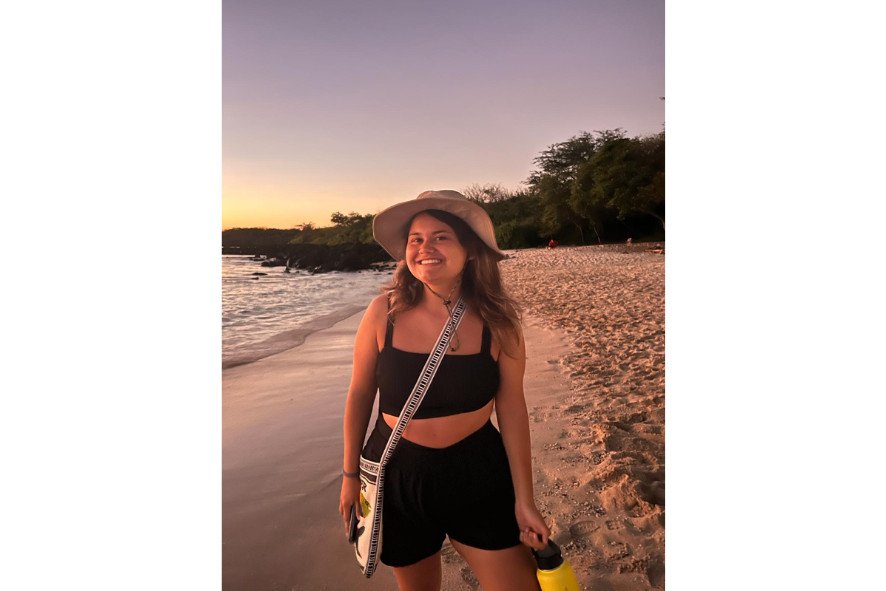
Arianna on a beach at sunset. Photo courtesy of Arianna Barajas
Growing up, Arianna Barajas loved animals and going on bike rides with her brother. Recently, she graduated from the University of Wisconsin-Madison with a degree in wildlife ecology. Additionally, Arianna was a 2023 cohort member of the Diversity in Conservation Internship Program. Through the program, she interned with the International Crane Foundation as their North America Program Crane Conservation Intern.
This summer, Arianna interned with the Lincoln Park Zoo in Chicago as a Population Biology Research Intern. Arianna’s work consisted of data entry and research related to population management for different wildlife. While she’s still exploring different aspects of her work, she knows she wants her future to remain in the conservation field.
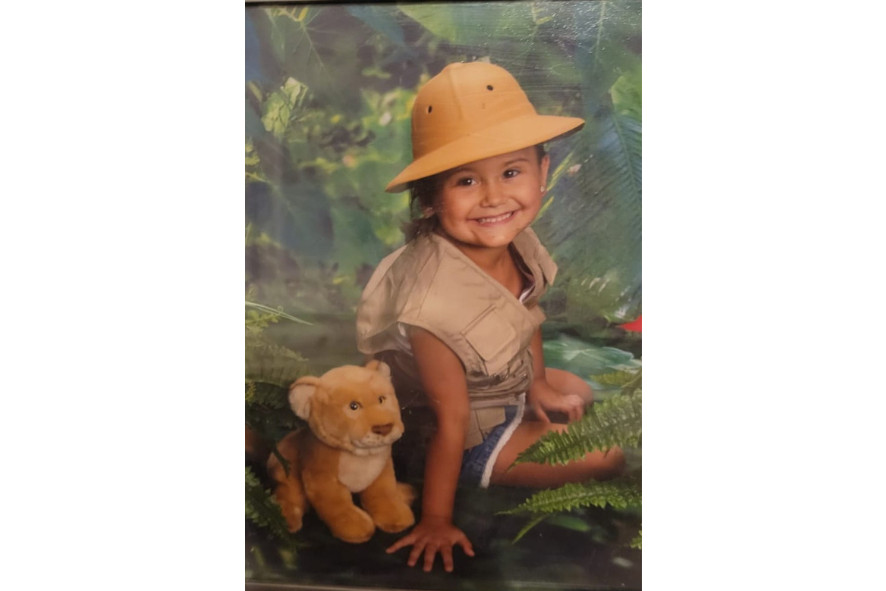
A young Arianna dressed up as a zoologist. Photo courtesy of Arianna Barajas
When asked about her relationship with conservation, Arianna says it has often showed up through the power of community. She recalls hearing about towns dedicated to preserving monarch butterflies, or how her parents’ hometown in Mexico started replanting trees after a forest burnt down. Arianna believes it is important to have diverse representation in the conservation field because different backgrounds and perspectives can bring more community-based conservation ideas forward.
One of the biggest barriers Arianna faced was never feeling like a job in conservation was an option. When she was little, Arianna assumed she would either be a doctor, a lawyer, or a police officer. A conservationist didn’t feel like a “Latine job.” Arianna says that increasing outreach to children, specifically outreach in Spanish, would be a huge step in the right direction to engage more Latine people in conservation.
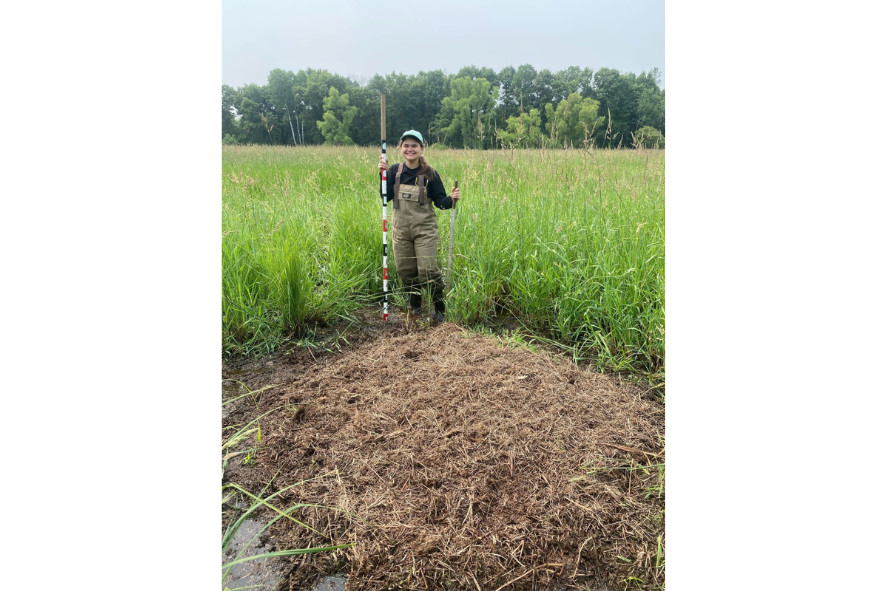
Arianna doing field work during her internship with the International Crane Foundation through NRF’s Diversity in Conservation Internship program. Photo courtesy of Arianna Barajas
Davin Lopez, Conservation Biologist at the Wisconsin Department of Natural Resources
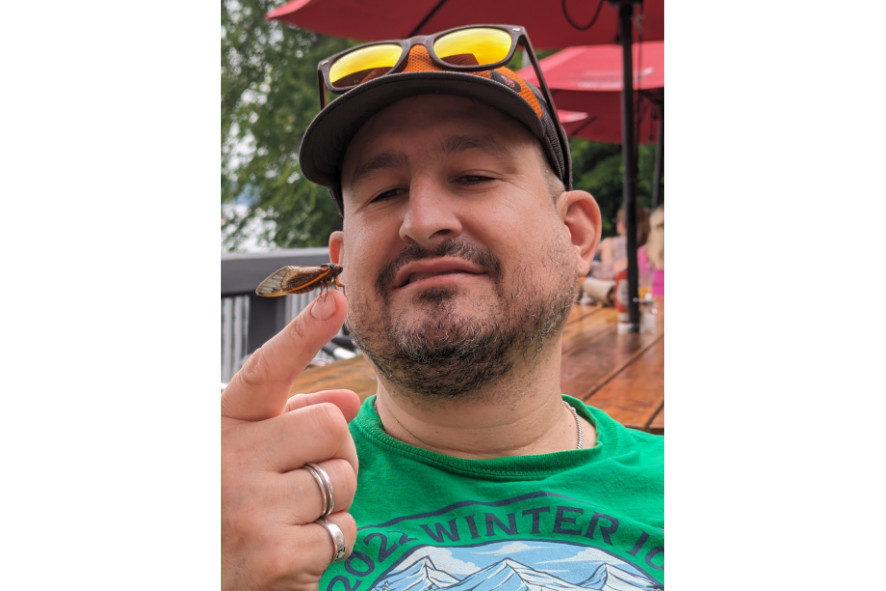
Davin holding a cicada on his finger. Photo by Julie Widholm
For as long as he can remember, Davin has always wanted to work with animals. Growing up, he loved looking for insects, lizards, and any other animals he could find. One of his fondest memories as a child was discovering a knot of Woodhouse’s toads in Utah. Davin grew up in Denver, Colorado and attended New Mexico State University where he studied zoology and physical anthropology. After school, Davin worked at the Denver Zoo and Pueblo Zoo. Then, he attended graduate school at the University of Wisconsin-Oshkosh doing research in population ecology.
In graduate school, David started as a field technician with the Wisconsin Department of Natural Resources’ (DNR) Chronic Wasting Disease program. He went on to be the statewide coordinator for that program. Since 2011, Davin has worked with the DNR’s Bureau of Natural Heritage Conservation (formerly known as Endangered Resources). He has worked with wolves, whooping cranes, and Kirtland’s warblers.
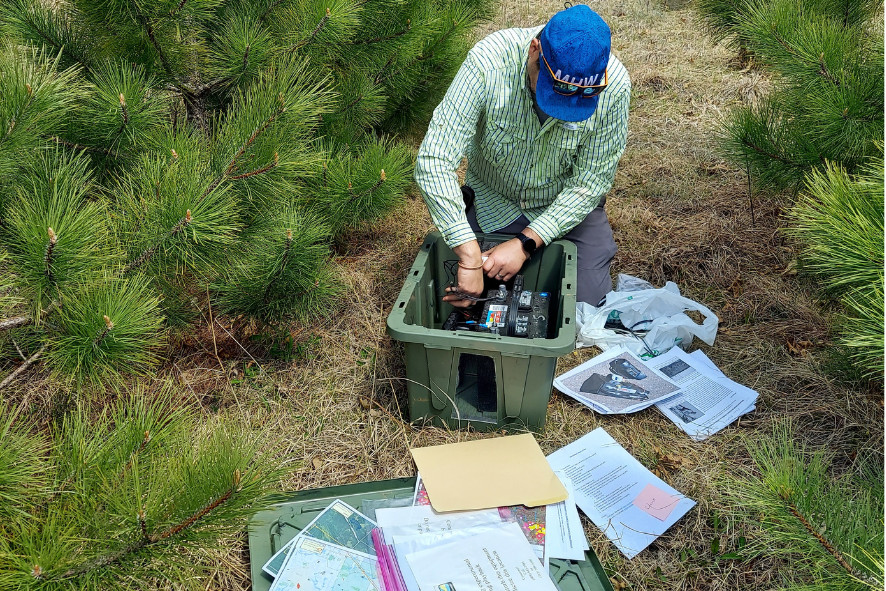
Davin kneeling on the forest floor with a bin full of field work equipment. Photo by Julie Widholm
Currently, Davin serves as the DNR’s whooping crane reintroduction coordinator and leads the Kirtland’s warbler conservation project. While they are still recovering, one of Davin’s proudest achievements has been being a part of the delisting of the Kirtland’s warbler. Reflecting on his work with the whooping cranes, Davin says, “being a part of trying to secure the future of whooping cranes, one of the most iconic animals in terms of endangered species in the history of North America, is incredibly rewarding.” He hopes to secure a successful Wisconsin population in the eastern flyway, saying that would be a “feather in my cap, no pun intended.”
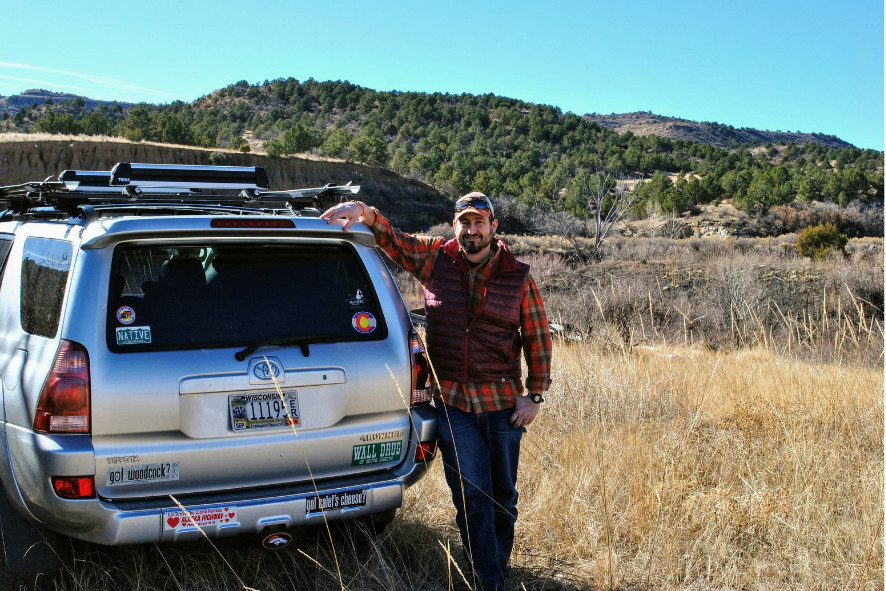
Davin standing next to a car while out doing field work. Photo by Julie Widholm
Since Davin started working at the DNR in 2005, the demographics of his coworkers have changed a lot. Now, there are more women, more people from nonhunting backgrounds, and more people of color working to protect Wisconsin’s natural resources. Davin says the best way to engage more diverse voices in conservation is by exposing people to nature, especially children. He says “[children] are not going to be interested in conservation if they are never exposed to what needs to be conserved. Whether that’s a city park or a program bringing you out in nature.”
When Davin was in middle school, he attended an outdoor recreation program that he loved. He returned as a mentor in high school and worked with kids who had never been out in nature before. For Davin, creating more of these types of experiences for children is the key to the future of conservation.
It’s imperative that those in the conservation field now continue to try to engage those communities for the future of conservation. By doing that work, we’re laying the groundwork for improving conservation efforts in the future.
Written by Emma Schatz, Digital Communications Coordinator